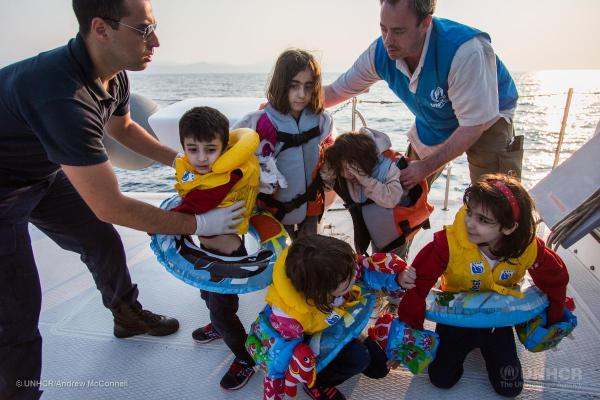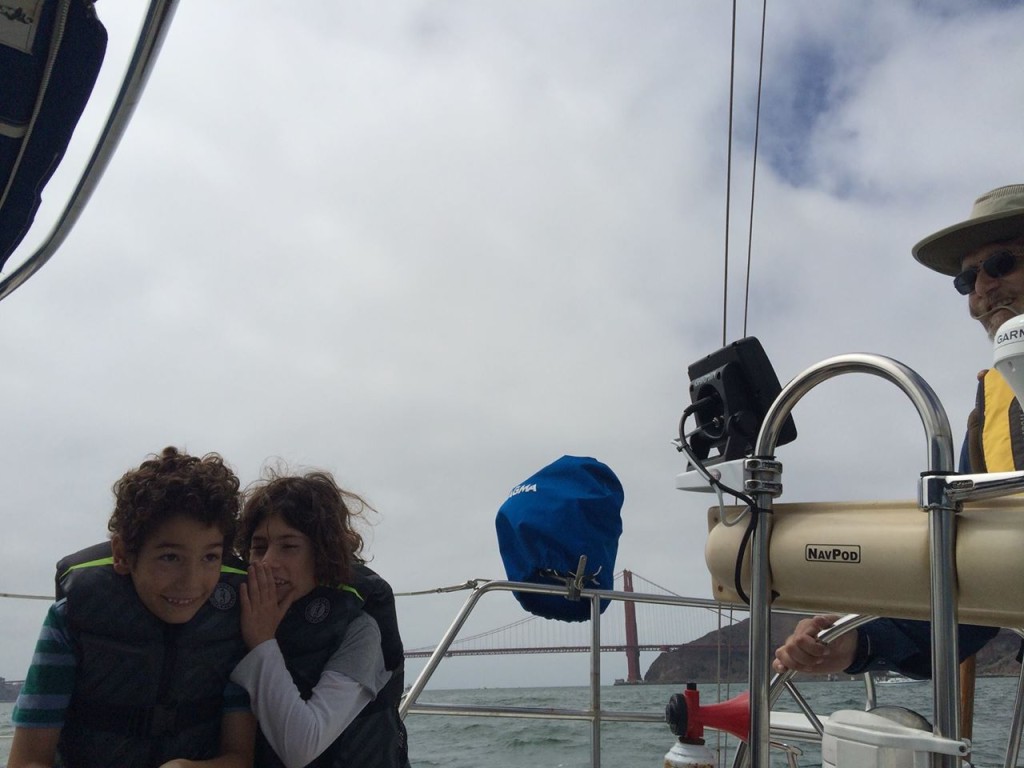Rescues at sea are dangerous and come with great possible cost to those involved. In this brief essay, I consider why, beyond a simple explanation of the imperative to protect life, civilian sailors rescue refugees at sea, and explore how specific extreme environments and professional identities may interface at the boundaries of humanitarian imagination, thought and action
Before MSF and the navies of EU states became more involved in intercepting boatloads of refugees sinking into the Mediterranean, the job of pulling them out of the sea often fell to the crews of rusted fishing boats sailing from Greek and North African ports and great container ships headed to the Suez Canal and points further East.
For the men on those vessels these kinds of rescues required them to stop fishing, pull their nets and return to port; or bring a massive 165,000 ton vessel traveling at 21 knots to a halt, drop smaller boats over the side and deploy ladders — and delay the arrival at their next port of call. For both the fishermen and the container ships’ captains rescue came with a cost to their livelihoods.
It’s also dangerous: moving on and off a boat adrift on a rolling sea is among the most treacherous and delicate of maneuvers; and bringing a group of desperate strangers fleeing war in Syria and Iraq or brutal dictatorships in African on board carries with it a whole host of health and safety concerns.
Rescue and Law of the Sea
In the case of the current Mediterranean refugee movement, the UNHCR prepared a legal brief outlining the responsibility of ships’ masters and others to conduct rescues at sea and apply many of the same rules governing refugees and others moving across land boundaries to this situation. The responsibility to rescue draws its modern legal basis from a series of 20th century conventions on maritime law which evolved out of an even earlier body of European and Islamic laws and customs on salvage, stowaways, enslaved sailors and piracy.
Among the most relevant documents cited by the UNHCR is the 1982 UN Convention on the Law of the Sea. According to its “Article 98: Duty to render assistance:”
-
Every State shall require the master of a ship flying its flag, in so far as he can do so without serious danger to the ship, the crew or the passengers: (a) to render assistance to any person found at sea in danger of being lost; (b) to proceed with all possible speed to the rescue of persons in distress, if informed of their need of assistance, in so far as such action may reasonably be expected of him…
In general this duty applies to ships in international waters – and primarily those moving between ports in different countries or on the high seas— it doesn’t apply to fishing boats just offshore. In any case, a master always has an escape clause from acting if a rescue is considered too “dangerous.”
For the fisherman, whose knowledge of international law may be limited or the container ship captain on a tight schedule, it’s unlikely that any state would ever hold them accountable for failing to rescue an un-flagged, overcrowded vessel; in fact the burden in most cases would be on the refugees to show in an admiralty or similar court that the ship passed them by without helping them. This is a situation where the international legal mandate to act is very weak and suggests a kind of voluntary compliance.
In a more traditional rescue-at-sea scenario, one in which a flagged ship founders, runs aground or is involved in a collision with another ship, an iceberg or a whale, the act of rescue may be done in anticipation of reciprocity for the state’s own fleet of ships. That anticipated reciprocity functions as a kind of mutual assistance pact among states; and one can imagine how that same balance might work on a more local level, where fisherman, and even recreational boaters, would aid one another to maintain that pact.
At this moment, though, a boatload of refugees, their states of origin and the failed state of Libya from whence they have come isn’t going to be involved in reciprocal rescues anytime soon. There is no “reward,” no reciprocal recognition of rights and privileges involved. The very lack of possible reciprocity helps define the humanitarian nature of the act of rescue. Humanitarianism itself is predicated on the lack of the reciprocal possibility. Were states and organizations that provide the majority of aid and assistance only to do so for individuals from states that could “return the favor,” humanitarianism would be quite limited in scope, indeed.
Refugees in extremis and the sailor’s humanity
Instead, I think the act of rescue has something to do with the nature of the sea and our relationship with it as humans. That thesis is based on my own thinking about the reason of humanitarianism and humanitarian rescue, but also my own experience as a sailor.
This last July, as the Mediterranean refugees were still being largely ignored by the EU, PBS Newshour’s Lisa Desai interviewed Captain Slaheddin of a Tunisian fishing boat that sails from the port town of Zarzis. As the captain explained:
One time we rescued 10 migrants. [though in Arabic he used the work for refugee, al-laji’. When they got on the boat two of them started praying. It gave me chills, all over my body. We are fisherman. We are here to make a living. We are not here to rescue people, but we have a feeling of humanity. So if I find someone on the sea I will save him…
It’s a powerful feeling to see someone helpless, hungry and being burned by the sun. It’s very hard: you are in front of someone who is calling for help.
Captain Slaheddin used the very old Arabic word al-bashariyya for the concept of humanity, rather than the modern neologism al-insaniyya, which an Arabic-speaker familiar with the concept of human rights would probably use. The older word carries with it a broader sense of the feeling of corporeal human and human-ness – the feeling of belonging to a humankind, as opposed to an animal or supernatural kind. That solidarity of the human against the vastness of the sea and an empathetic consciousness of how small and fragile human life is in the face of it is what moved him to rescue. Like most fisherman, Captain Slaheddin most likely grew up fishing as the son of a fisherman and had seen the terrible price the Mediterranean can exact throughout his entire life.
On the other side of the rescue equation, I’ve experienced myself that sense of being helpless in the face of the sea. As a boy I fell overboard from the foredeck of a 27ft sloop while my father steered it North through the Swanson Channel in British Columbia. When I returned to the surface, I watched the boat grow smaller and smaller as the crew — my family — readied to come about and attempt a man-over-board rescue. In that moment no matter how hard one tries to remain calm, your legs and arms claw at the sea around you; your lungs ache to breath and your mouth and eyes burn from the bitter taste of salt. Your world has turned into a small white right triangle of sail in the distance and a green-blue heaving sea. The line between being and not being is that rescue.
Those onboard know that, too; and a well-trained crew can pull you from the water before hypothermia takes you or you drift from reach. I was back on board, shivering and embarrassed in just a matter of minutes.
I still sail, but now mostly in the San Francisco Bay and off the wild coast of Marin. The water is as cold and the currents as treacherous as anywhere on the West Coast. While sailing, my crew and I have helped in rescues and we practice and practice throughout our sailing careers the figure eight technique that brings the boat abeam of those in the water. As I stand at the helm of my own boat, in the shadow of the Golden Gate Bridge, and watch my kids move around on deck, I know that the sea, so beautiful, would become the merciless enemy the moment one of them trips and tumbles into it.
The exquisite beauty and danger of the sea is the certain knowledge all sailors have and have had for the 50 centuries of human seafaring. The sailor knows the danger and has the capacity to rescue. This creates a specific burden on their humanity, which is both a response to their own experience of the overwhelming nature of the sea and their specific professional expertise as a seafarer. A failure to rescue becomes a problem of the sailor’s humanity that drives him to act and pull the refugee onboard.
The unique challenge of the sea to the problem of humanity is suggestive of how the human response to human need and suffering can be influenced by the way we interact culturally and traditionally with extreme environments or different kinds of natural disasters. This relationship is an under-recognized and certainly under-studied element of humanitarian thought and imagination, though it has the very real potential to connect it with emerging fields like environmental humanities and human geography.
With the IOM estimating that some 30,000 might drown in the Mediterranean this year, the sea is exacting its toll.



